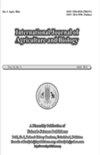Evaluation of Antagonistic Bacillus and Biochar against Soybean Root Rot Caused by Fusarium oxysporum
Q2 Agricultural and Biological Sciences
引用次数: 0
Abstract
Soybean root rot is a worldwide soil-borne fungal disease threatening soybean production, causing huge losses in yield and quality of soybean. Fusarium species are well recognized as the important causal agent of Fusarium root rot. To screen the beneficial Bacillus strains with capability of suppressing soybean root rot and evaluate the impact of Bacillus combined with biochar against soybean root rot, a pot experiment was conducted with different treatments. In this study, as potential biological control measures, antagonistic Bacillus isolates and different types of biochar were added to soil separately and excellent antagonistic strains mixed with bamboo biochar were applied to the soil. The results showed that seven Bacillus strains promoted the growth of soybean seedlings and reduced root rot severity by 33 to 61%. Bacillus amylolique faciens NH2 was associated with the lowest incidence of soybean root rot, indicating its bio-control potential. The value of plant height, root length and plant dry weight of soybean in the sterilized soil mixed with biochar separately treatment were superior to those of soybean in the inoculated with pathogen treatment, especially the bamboo biochar treatment reduced soybean root rot caused by Fusarium significantly and which bio-control efficacy was 77.41%. The soybean plants shoot and root dry weights in the biochar mixed B. amylolique faciens NH2 or B. subtilis DBK treatments were increased by17.1, 10.7% and 19.51, 19.64%, respectively, which were significantly higher than those of the inoculated pathogen treatment. Compared to antagonistic strain or biochar individual treatments, the disease control efficiency on soybean root rot was up to 64.86% in NH2 strain mixed with bamboo biochar treatment, which reduced root rot severity significantly and showed a synergistic effect. These results suggest that antagonistic Bacillus strains mixed with biochar can be used as an effective alternative in managing soybean root rot. © 2021 Friends Science Publishers拮抗芽孢杆菌和生物炭对大豆尖孢镰刀菌根腐病的防治效果评价
大豆根腐病是一种世界性的土传真菌病害,威胁着大豆的生产,给大豆的产量和品质造成巨大损失。镰刀菌是引起大豆根腐病的重要病原菌。为了筛选具有抑制大豆根腐病能力的有益芽孢杆菌菌株,并评价芽孢杆菌与生物炭联合施用对大豆根腐病的防治效果,进行了不同处理的盆栽试验。在本研究中,作为潜在的生物防治措施,分别在土壤中添加拮抗芽孢杆菌分离株和不同类型的生物炭,并将拮抗菌株与竹生物炭混合施用于土壤中。结果表明,7株芽孢杆菌对大豆幼苗生长有促进作用,根腐病严重程度降低33% ~ 61%。淀粉样芽孢杆菌NH2与大豆根腐病发病率最低相关,表明其生物防治潜力。无菌土壤与生物炭分别处理的大豆株高、根长和植株干重值均优于接种病菌处理的大豆,特别是竹生物炭处理显著降低了镰刀菌引起的大豆根腐病,生物防治效果为77.41%。生物炭混合淀粉样芽孢杆菌NH2和枯草芽孢杆菌DBK处理的大豆植株茎部和根系干重分别提高了17.1%、10.7%和19.51%、19.64%,均显著高于接种菌处理。与拮抗菌种或生物炭单独处理相比,NH2菌种与竹生物炭混合处理对大豆根腐病的防治效率高达64.86%,显著降低了根腐病的严重程度,并表现出协同效应。这些结果表明,与生物炭混合的拮抗芽孢杆菌菌株可作为管理大豆根腐病的有效替代方法。©2021 Friends Science Publishers
本文章由计算机程序翻译,如有差异,请以英文原文为准。
求助全文
约1分钟内获得全文
求助全文
来源期刊

International Journal of Agriculture and Biology
AGRICULTURE, MULTIDISCIPLINARY-
CiteScore
1.70
自引率
0.00%
发文量
40
审稿时长
5 months
期刊介绍:
Information not localized
 求助内容:
求助内容: 应助结果提醒方式:
应助结果提醒方式:


